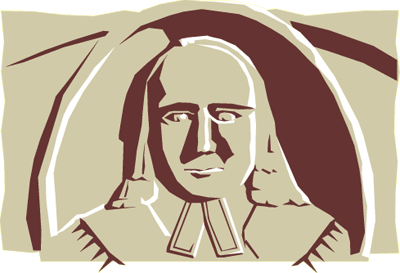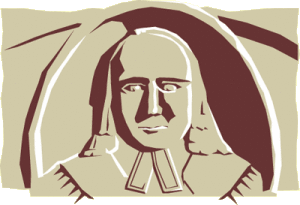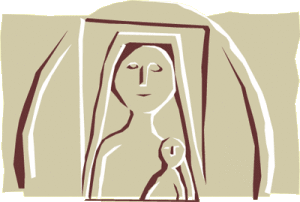Giving Voices

Four poems of seventeenth-century America
Gone forever, probably, are histories by the likes of Francis Parkman and Henry Adams that relied on atmospheric renderings of time and place. So much more leisurely and pleasurable they remain to read than the specialized and data-laden monographs that have become the stock-in-trade of professional historians today. And yet scholars may in time begin again to wish for some pleasing medium between the two extremes—between history written with the help of the muse, that is, and history written as if it were a science. History’s ability to accommodate a lay readership hangs in the balance. In his 1989 essay “Where is History Now?” the irascible Jacques Barzun built an extended lament that “theory, generality, abstraction have by now displaced the concrete imagination of past events.”
In the following poems I set out to address Barzun’s lament. Instead of focusing on the mercantile and clerical elite, as so many students of early New England have, I focus most on individuals from low and middling classes who were more occupied with passing the bread than passing into heaven. Popular beliefs—prodigies, portents, myths, wonders, and lore—were as important to them as the words of Cotton Mather and his kind.
To lay hands on prodigies and lore of these folk is often difficult. The books and pamphlets where they reside are rarely part of the literary canon as we have received it, rarely available in anthologies or from university presses. The scholar accordingly must burrow deep into dusty repositories and comb through cabinets of microfiche to grasp hold of them. Between the lines, buried deep in the least likely passages, among small tidbits of oral lore, they can be heard but only faintly. The present poems aim to give their voices volume.
Sarah Hawkridge
Timid as a titmouse
My breath rose
Each night your hand lifted the latch.
Six children, Mister Cotton,
Six rings of birth fire for your name.
The gift of speech,
The gospel fire,
Did it come upon you
Unaware? You heard my poems
Only rarely, when I dared.
Bedtimes I settled on you
Like a wreath.
The walls sustained our
Silent straining, each to each.
Husband, father, scourge of faith,
You plucked my hem
Last night
From your death-bed.
And I could not sway you
From your fancy, could not pray,
So firmly you clung to me.
American Triptych
Thomas Wannerton
Too unwieldy, my rifle, no matter how wolves
Skulked about our sheep-cotes after dark.
And so I would not carry it afield.
For my laxness Tom scolded me and downed
A pint of kill-devil rum in a draught
To charm away all harm. My herbal served
Me better: that fat folio of Gerard
Kept the gathered leaves pressed fresh.
Last night when I got home, Tom
Drank again, slept in fits, and woke up
Shouting: Wolves as many as Hannibal’s troops
Lay siege to the house, he cried. One ram
Lunged from his voice, tried to jump a fence
And bawled and thrashed there, impaled on a stake.Richard Foxwell
His ears grew upright, no round folds.
The tavern candle daubed them oxblood.
Tongues of smoke issued from his pipe
And curled along his cheeks. Into his Port
He stirred sugar and told me how
To read the New World by its omens:
Listen outside of town when the moon is full,
The wind spent after blowing. One night
A sweet voice did call to him: Foxwell, Foxwell,
Test your wings. Amid the clouds he saw
A fire, with men and women dancing
Naked in a ring. He would have joined them, worn
His hair in tufts as they did, and minced
Burn-free in the flames, did he not
Love the comforts of his pipe and cup so much.Michael Mitton
Reeds and the beech trees leaning, sea gusts
Trumpeting across the cove, geese rose
Off the water yelping then crumpled
Before we heard his gun thud.
He swung the wounded birds like plummets.
Neatly afterward in his log he wrote
The lot, charge, wind drift, shot, and distance
Alongside what fees the meat might fetch
In Boston. A great hunter, a nonpareil, his eye
Can out a fowl’s at three rods, and yet
His hands curl just like mine in every way.
The housewives who buy his wares
Bend to their task on the beach and send
The plucked down lofting across the waves.
Mary Dyer
Whoever comes to see my stillborn girl
Might flinch to find my face
Within the crowd. But there I’ll crane
And press with all the rest
As if the news concerned an inner light
Flashed from some saint’s eyes.Winthrop ordered her displayed this afternoon
To ripen the fruit of my unquiet mood.Unearthed by spades to please another round of guests,
She calls me now to rise from my own bed
And join her on the stage.
It distresses her that scales still blind each eye
And each ear hears a voice
Summoning folks to view the error of my ways.If they speak true who say a corpse will bleed
Anew when viewed by he who’s slain,
Let Winthrop come and watch the fresh blood well.
He’ll call it magic when her wounds
Gape wide again and spill to prove his guilt.The Great Awakening
Today in meeting Mr. Edwards said
We all should tumble into Hell
Were God a moment to withdraw the web
That suspends us. How well
The spinner must have spun, how full of dread
We stand before the bench to pay
Our tribute. Chokes and sobs and vows
Rose from the congregation Edwards hailed.
He laid his hand upon a babe’s brow
Who slumbered through the sermon: “Nor will they
Be spared, the innocents, our mistakes
Having stained them.” So he invoked
Our sins in tones as low as though he prayed.
And yet the infant woke
Whose mother hushed her and shone red with shame.
This article originally appeared in issue 6.2 (January, 2006).
Paul Lindholdt is associate professor in English at Eastern Washington University and the author of essays and poems in American Quarterly, Chicago Review, Seattle Review, Sewanee Review, Skeptic, and Wild Earth. His Canoe and the Saddle: A Critical Edition is forthcoming in 2006 from Bison Books.

